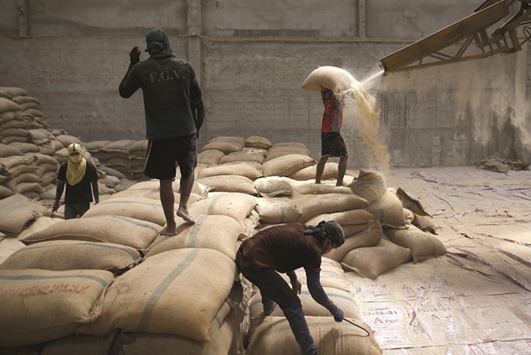Thailand reported economic growth of 2.8% in 2015, compared with 0.8% the previous year, but its recovery remains fragile as exports and domestic consumption are weak and political uncertainties linger.
Fourth-quarter and full-year data released yesterday about Southeast Asia’s second-largest economy was a mix of good and bad news.
And the state planning agency cut its forecast for 2016 growth to 2.8-3.8% from the 3-4% range it saw in November.
With the traditional growth pillars of exports and consumption still shaky long after the military seized power in May 2014, government investment – up 41% on the year in the fourth quarter – has helped lift the economy.
“While fiscal spending should help prop up the economy in 2016, the pace of recovery will be gradual, given the backdrop of continued political uncertainty and high household debt,” Krystal Tan of Capital Economics in Singapore said in a note. Weiwen Ng, economist at ANZ, said that “fiscal therapy” has helped, “but the risk is that domestic demand could be derailed after expiration of tax incentives, which largely propped up Q4.”
In October-December, the economy grew 0.8% from the previous quarter on a seasonally-adjusted basis, less than the 1% in July-September and the 0.9% expected in a Reuters poll.
On an annual basis, growth was 2.8%, between the Reuters poll’s 2.7% forecast and third-quarter’s 2.9%, the National Economic and Social Development Board (NESDB) said.
Barnabas Gan of OCBC in Singapore said that despite the global slowdown, Thailand posted “a rather robust growth print”.
But the global picture makes many gloomy on Thai exports, which are worth about two-thirds of gross domestic product.
Exports have contracted three straight years, and the NESDB yesterday cut its 2016 estimate for shipments to grow 1.2% from its previous forecast of 3%.
NESDB chief Porametee Vimolsiri said it revised growth and export forecasts “as global risks have increased”. Gundy Cahyadi, economist at DBS in Singapore, said while it’s good that government spending is supporting the economy, this “underscores the sluggishness of private demand”.
The reduced export forecast “clearly indicates that the authorities are not expecting any boost from external demand,” he said.
Bank of Thailand governor Veerathai Santiprabhob warned on Thursday there were great downside risks to the recovery, which he described as still gradual and uneven. The BoT has predicted 3.5% GDP growth this year, with flat exports.
That puts the burden on the junta, which has boosted state spending, to aid growth. In an attempt to lift activity, it changed its economic team in August and introduced stimulus measures, including ones worth 136bn baht ($3.81bn) aimed at helping rural areas.
Last month, it approved a 35bn baht programme for the grassroots economy.
Butbns of dollars in public spending aimed at reviving the ailing rural economy have failed to reach farmers, fuelling disaffection with the junta ahead of elections expected next year.

Workers unload sacks of rotten rice at a warehouse in Ratchaburi province. Thailand yesterday reported economic growth of 2.8% in 2015, against 0.8% in 2014.
